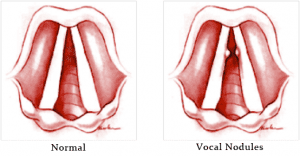For the professional singer, an injury to the voice can be devastating. Resolving such injuries can require any number of measures, ranging from vocal rest and therapy to surgical intervention. There is a common misconception that vocal injuries, such as vocal nodules, are solely the result of poor vocal technique or vocal abuse. While this is not always the case, this misunderstanding has created a stigma against singers with vocal nodules, which can make dealing with such an injury even more difficult. Understanding more about vocal nodules—what they are, and what causes them—can help singers to take measures to protect themselves and their vocal health.
What Are Vocal Nodules?
In order to understand how vocal nodules form, we need to know a bit about the anatomy of the vocal folds. The vocal folds are soft tissue housed inside the larynx. As we sing or speak, air moves through our larynx, and the folds vibrate together to create sound. The folds consist of multiple layers, including an exterior mucus membrane, ligament, and muscle. Nodules most often occur in the outer mucosal layers of the folds. Nodules themselves are somewhat like a callous, which develops on the vocal folds and keeps them from closing evenly or vibrating symmetrically.
Thanks to the Cleveland Clinic for this detailed image.
What Does It Sound Like When Singers With Vocal Nodules Sing?
When singers with vocal nodules attempt to sing, they may experience multiple worrisome symptoms that indicate a problem. The most common of these are:
- Vocal hoarseness or a raspy quality to the sound.
- Experiencing a vocal “crack” or breaking sound.
- Vocal fatigue.
- Decrease in vocal range.
In addition to these symptoms, singers may experience a general sensation of having a lump in their throat, or may feel an excessive need to clear their throat, even when they are not singing.
What Causes Vocal Nodules?
Vocal misuse is the most common cause of vocal nodules. Nodules develop when the vocal folds repeatedly come together in a harsh fashion, such as from screaming, straining, or prolonged overuse. However, nodules don’t usually develop just from one day of vocal abuse.
Nodules more frequently develop from repeated misuse over time. Another point worth mentioning is that nodules can develop from prolonged singing on vocal folds that are inflamed due to acid reflux disease or severe allergies. While singers can take measures to control these factors by changes in diet and medication, some singers may still be more prone to developing vocal nodules through no fault of their own.
How Are Vocal Nodules Diagnosed and Treated?
If a singer experiences any of the symptoms of vocal nodules, they should make an appointment with an otolaryngologist or Ear, Nose & Throat specialist. These doctors can perform a laryngoscopy, wherein they insert a tiny camera through the nose to gain a view of the vocal folds. If a doctor sees the presence of vocal nodules, the most common course of action is to suggest vocal rest (abstaining from singing or speaking) and vocal therapy. Vocal nodules can also be treated surgically, although this is an option of last resort in most cases.
What Steps Can Singers Take to Avoid Vocal Nodules?
The following is a list of steps singers can take to protect themselves from developing vocal nodules.
- Refrain from abusing or overusing the voice. Singers should take care not to scream or yell, and should also take care not to overuse their voice in the course of a long day of rehearsal, recording, or teaching.
- Make sure you work with a voice teacher to develop strong vocal technique, consisting of proper breath support and tension-free sound creation, so that you are never straining your muscles while singing. Take care to warm the voice up properly before singing.
- Don’t push your voice beyond its capabilities. If you find yourself becoming vocally fatigued from any activity, speaking or singing, stop and give your voice a rest.
- Stay hydrated. Being that the vocal folds are soft tissue with a mucosal membrane, they are greatly affected by our body’s general level of hydration. Singers should make sure to drink fluids frequently, and refrain from consuming dehydrating substances such as caffeine or alcohol.
- Be aware of factors that can cause vocal fold inflammation, such as acid reflux or seasonal allergies. If you know you are prone to experiencing these things, be proactive in mitigating them through diet and medication. Consult your doctor about what treatment may work best for you.
- If you experience any of the symptoms of vocal nodules, get to a doctor as soon as possible. Do not risk aggravating the condition further.
For anyone who uses their voice in a professional capacity—either as a singer, teacher, or professional speaker—it is imperative to take care of the voice and protect against preventable vocal injury. Singers should seek guidance from both their teachers and their physicians in determining the best course of action to keep their voice healthy. Through better understanding the types of injuries the voice can endure, and what factors can lead to those injuries, we can hopefully take steps to guard ourselves against harm, and preserve our voices for a lifetime of sustainable use.
Pamela Stein Lynde


